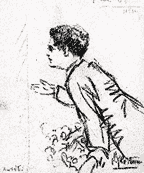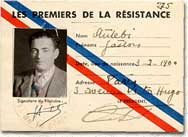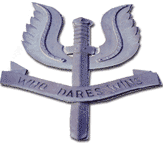|
|
|
|
|
|
|
|
|
|
|
My Father
Childhood/ Adolescence
My father, Gaston-Gabriel was born at 9 a.m. on the 3rd January1900 in Neuilly-Sur-Seine, a suburb of Paris.
He was aged 6 months, when his parents took him back to Ottoman Palestine, where they lived in Jerusalem (photo on the left), he was educated at the German and Protestant Evangelische Hochschule. At 13, he was sent by his parents, with his eldest brother, to France, in order to study at the Lycée Lakanal, in Sceaux, near Paris. He would never again see his father, who died tragically in Constantinople, in March 1919. On the other hand, he would see frequently the members of the Jouvenel and Deutsch de la Meurthe families, and would become a « true Parisian ». Throughout his life, he would love flowers and refinement.
|
|
|
|
|
 |
|
|
|
|
|
|
|
|
|
|
|
|
|
|
|
Student President
In 1920, he passed the entrance exam for the Advanced School for Aeronautics (Ecole Supérieure d’Aéronautique or ESA) and in 1922, he was elected President of the Sciences section of the AG (General Association of Students) of Paris. In October 1923, he succeeded his friend André Claude (nephew of Georges Claude, the inventor of neon tubes and liquid air). Re-elected in 1924, he became also President of the National Union of Students of France and became close to the founder of the Radical-Socialist Party, Edouard Herriot (photo on the rignt) . One of the founders of the Cité Universitaire (« Academic district » with housing and facilities for foreign students), he was there at the inception of the Hall of Residence Deutsch de la Meurthe. He also participated a lot in the Paris-University Club (PUC), founded in 1906, but really brought to life in the early 1920s, by an engineer and rugby player with a huge personality, Jean Petitjean, who became my father’s best friend : they organized, in 1924, an “incredible banquet”, with Firmin Gémier, head of the Odeon Theatre.
In 1923, the new President of Students in Paris, had already organized at the Opera a « Bal Directoire » (photo on the right), which raised money for the Students Hall, and the story was picked up by the satirical newspaper Canard Enchaîné, represented by René Buzelin, who wrote about the “Merveilleuses” – “renowned actresses in delightful dress, colourful cuisse de nymphe émue (“provocative legs of nymphs”) or Phi-Phi pâle effarouché – or the “Incroyables” – politicians like Mrs. Poincaré, Millerand or Maginot. In the States, it was such an event that the Chicago Tribune published the photos “of a very French event”. February 24, 1924, Le Petit Journal illustré (photo above) published on the front page the picture of the President of Students (Daddy), amongst a screaming crowd with the French flag, and the following caption :
Strong-arm tactics : In protest against the tax of 60 000 francs taken by the State on the benefits of the charity ball they organized at the Opera, four hundred students crowded into Avenue Victoria, invading the Welfare offices, and taking two of the managers prisoner, for an hour. In the end, the police arrived and expelled the demonstrators.
On Tuesday, the 14th of August 1928, André Guérin wrote an article in L’œuvre on the International Congress of Students with a photo of Antébi and a representative of the Society of Nations : 1200 students, representing 49 nations, have come together in Paris to discuss their problems.
|
|
|
|
|
 |
|
|
|
My father sketched by Pierre-Jean Poitevin (1889-1933), cartoonist fot "l'illustration" and for
"Le Petit Parisien"
|
|
|
|
|
|
|
|
|
|
|
|
|
|
|
SAS « Who Dares Wins »
Married October 9, 1939, he lived between Paris (7 rue Michel-Ange) and Lyon (52 rue Sala), and travelled to Swizerland and Spain for the Foreign Department (which he had established in 1932) of the Claude Company, and enlisted the 17th of November 1942 in Casablanca to go to London and join General de Gaulle.
Captured in Spain and, then, prisoner of war in a camp at Miranda (17th November 1942-1st April 1943), he flew through Gibraltar and boarded a British ship. By the Spring 1943, he joined the SAS (Special Air Service), whose motto was: “Who Dares Wins”. In London, Captain Georges Bergé, at St Stephens House, had convinced General de Gaulle of the importance of having a parachutist corps trained to jump in France. On the 29th of September 1940, the First Airborne Company was placed under his authority.
In Great-Britain, Gaston Antébi entered the 4th Battalion SAS-2RCP (regiment of chasseurs parachutistes or « parachutist fighters »), made up of SAS veterans returned from Africa, and volunteers very recently arrived : from the 6th of December 1942, they were trained in Scotland, at Largo. Training in Scotland with them, my father had lied about his age, because he wanted to be “one of the firsts to touch the Land of a liberated France” : everybody accepted that he was just 30, when he was actually 43. In Scotland, he happened to meet the future queen Elizabeth who was serving in the army (as a result of this meeting, impressed by her courage, he named me after her, in 1945). In London, he used to dine quite often at the restaurant Prunier – Mrs Prunier having decided to keep open (and free) house for the heroes of France Libre (Free France).
Dropped into Bretagne, during the night of the 5th to the 6th of June 1944, in order to divert the attention of the Germans and to delay their progress toward Normandy, he took part in the terrible fights of the maquis de Saint-Marcel (especially that of the 18th of June) under Colonel Bourgoin and entered Paris at the end of August 1944. Of the 450 men fighting in Bretagne, only half of them had survived, by the time of the arrival of the Americans on the 17th of August (the day when my father’s friend, Mauduit, liberated the city of Paimpol). Others had been killed, wounded or taken prisoner. In the photo at the parade on the Champs-Elysées, my father is walking just behind the flags … even if he is a little out of focus. But someone told the following anecdote of just before the parade: at the moment when a handful of heroes, having liberated Paris, under the Arc-de-Triomphe, being about to rekindle the Eternal Flame… no sign of Gaston Antébi. He had borrowed some money from a friend , run in the direction of Auteuil area, where he used to live. There, he found his former florist from before the war, took all the flowers in the shop to make a magnificent wreath and rushed back: for him, the Liberation with no flowers (and no champagne) would have been a pity.
After the war, his best friends became Henri Déplante (Dassault’s engineer who « invented » the Mirage military plane), Michel de Camaret (who was fighting, then, with the Christian population of Lebanon), Henri de Mauduit, lord of the manor Bourblanc, in Bretagne, whose wife had been in the concentration camp of Ravensbruck during the war, André Gabaudan and Pierre Puech-Samson. On the 25th of May 1946, my father was made captain, and on the 13thJanuary1948, Chevalier de la Légion d’Honneur with Croix de Guerre avec Palmes, as « An officer of splendid courage and nerve […] He had participated in many battles for the liberation of Bretagne. Then, he was sent with the 2nd Regiment of Chasseurs Parachutistes into the Loire Valley and into Sologne, attracting attention with his tremendous courage and daring and his great spirit of initiative, specially during the night of the 7th to 8th of September1944 against an enemy which vastly outnumbered them and were better armed. Because of his steely nerve, he saved his group from annihilation and took many prisoners.»
|
|
|
|
|
 |
|
|
 |
|
 |
|
|
|
|
|
|
|
|
After the War
Before the war, my father was a director of the Claude Paz Company, where he had created in 1932 the Foreign Department. He had also been a member of the Foreign Trade Council.
After the war, life no longer had the same panache. France was to be reconstructed and the divisions were terrible. My father told me once that he went to see a former contact from the time when he was student president, researcher Joliot-Curie, to ask him to help in the liberation of Georges Claude (photo on the right), who had been sent to jail (he would remain there till 1949) because he was a Scientific advisor for the Vichy government. Joliot-Curie refused, arguing that the Communist Party – his Party – would never accept that kind of individual intervention. That kind of answer, and the exactions committed by the Communist purging networks – among them, shaving women’ heads –, as well as money and favours sought by Resistance fighters at the last minute, have always disgusted my father and he has never wanted since to be involved in politics, even though he was a friend of prefects and ministers (Benedetti, prefect of Paris, Motz minister in Belgium…). In 1958, he took me with him to the Universal Exhibition in Brussels, and I could admire neon stars and fountains, the creation of which he had contributed to. As a child, I used to say that my father was “writing with light in the sky”.
|
|
|
|
|
|
|
|
|
|
|
|
|
|
|
|
|
|
|
|
|
|
|
|
|
|
|




